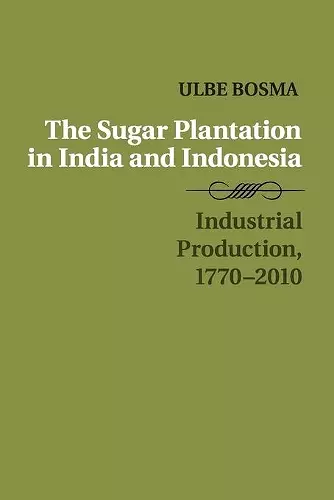The Sugar Plantation in India and Indonesia
Industrial Production, 1770–2010
Format:Paperback
Publisher:Cambridge University Press
Published:1st Sep '16
Currently unavailable, and unfortunately no date known when it will be back
This paperback is available in another edition too:
- Hardback£90.00(9781107039698)

In this book, Ulbe Bosma details how the British and Dutch introduced the sugar plantation model in Asia around 1800, when abolitionist campaigns in the Caribbean began, and refashioned it over time. Previously, European markets had almost exclusively relied on Caribbean sugar produced by slave labor.European markets almost exclusively relied on Caribbean sugar produced by slave labor until abolitionist campaigns began around 1800. Thereafter, importing Asian sugar and transferring plantation production to Asia became a serious option for the Western world. In this book, Ulbe Bosma details how the British and Dutch introduced the sugar plantation model in Asia and refashioned it over time. Although initial attempts by British planters in India failed, the Dutch colonial administration was far more successful in Java, where it introduced in 1830 a system of forced cultivation that tied local peasant production to industrial manufacturing. A century later, India adopted the Java model in combination with farmers' cooperatives rather than employing coercive measures. Cooperatives did not prevent industrial sugar production from exploiting small farmers and cane cutters, however, and Bosma finds that much of modern sugar production in Asia resembles the abuses of labor by the old plantation systems of the Caribbean.
'This well-researched global history of a major traditional industry of Asia (sugar) breaks new ground. Departing from the usual preoccupation with plantations, Bosma draws our attention to small-scale production systems and associated property regimes, and connects sugar with empire, India with Indonesia, and colonial developments with postcolonial ones. The book should encourage historians to rethink the notion of industrialization.' Tirthankar Roy, London School of Economics and Political Science
'… [a] magisterial work … a work of considerable importance that will be a valuable addition to the libraries of economic history.' Martin Bourke, Asian Affairs
'Sugar historians will find this book rewarding as it is rich with details about cane-sugar production in India and Indonesia. The book contrasts the introduction and development of plantation-based production of sugar in both countries following the 1835 abolition of slavery in the United Kingdom and its dependencies.' Pierre van der Eng, World Sugar History Newsletter
ISBN: 9781316621165
Dimensions: 228mm x 152mm x 20mm
Weight: 510g
336 pages